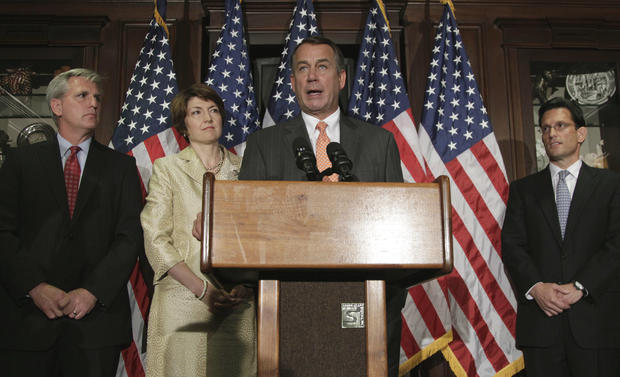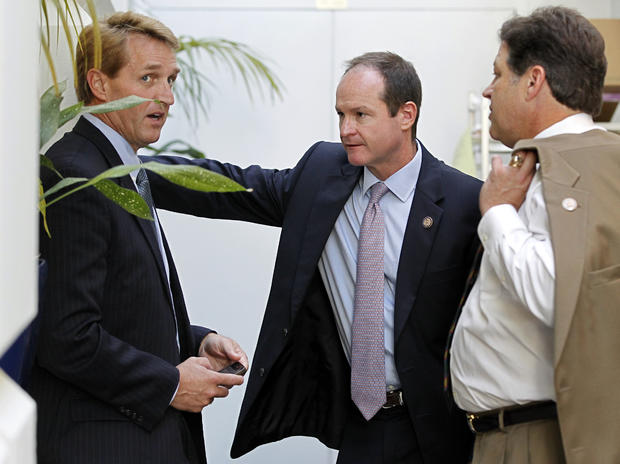Republicans divided with vote on Boehner debt plan on tap
Updated at 2:45 p.m. ET
House Speaker John Boehner told Republican House members yesterday to "get your ass in line" and vote for his plan to raise the debt limit and reduce the deficit. Today, Boehner will find out if his GOP caucus really is willing to get in line.
The Republican-led House will vote today on Boehner's plan, which would increase the U.S. borrowing limit by up to $900 billion while cutting more than $900 billion in spending over the next decade. With just five days until the White House says the U.S. will exhaust its borrowing authority, it's just about the only plan moving forward. Senate Majority Leader Harry Reid put forward a plan that could cut around $2 trillion in debt and raise the debt ceiling at least through the end of 2012, but it's unclear if or when the Senate will vote on it.
But even if Boehner's plan does make progress in the House, it will come to a dead stop in the Senate, where the Democratic majority is standing solidly against it.
Special report: America's debt battle
In case Senate Democrats hadn't made themselves clear earlier (yesterday, they repudiated the Boehner plan as a "big wet kiss" to the Tea Party), last night they sent House Republicans a letter in opposition to the plan. All 51 Senate Democrats and two Democratic-voting independents are prepared to vote against it.
Reid said on the Senate floor Thursday that if the House passes the Boehner bill, the Senate will take it up immediately -- and defeat it just as quickly.
"It will be defeated," Reid said. "No Democrat will vote for a short-term Band-Aid that would put our economy at risk and put the nation back in this untenable situation a few short months from now."
Meanwhile, as Washington remains deadlocked over its debt, Wall Street is starting to squirm. The Dow Jones industrial average fell nearly 200 points on Wednesday.
It's unclear whether the House GOP caucus will support Boehner's bill this afternoon. Some prominent Republicans are publicly backing it, including conservatives like Reps. Darrell Issa, R-Calif., Mike Pence, R-Ind., and Tea Partier Rep. Allen West, R-Fla.
About 20 House Republican freshmen held a press conference outside of the Capitol Thursday morning to say that Boehner's plan is imperfect but worthy of their support.
Rep. Steven Palazzo, R-Miss., said that back in January, as many as 87 House Republicans would have opposed the plan. But with the clock ticking, the GOP caucus understands it has limited choices left.
"We didn't come up here to punt on the hard and difficult decisions," he said. He added that House Republican leadership didn't put pressure on GOP freshmen to support it and gave the caucus plenty of time to review the plan.
Rep. Martha Roby, R-Ala., said that Boehner's plan was a better alternative to doing nothing and risking default, or supporting Reid's plan, which she said is "fundamentally a budget gimmick."
"The Boehner plan is far from perfect," Roby said. Boehner, "like all of us, must work within the political reality that Democrats still run Washington... [and] want more spending and more borrowing."
Still, a significant number of House Republicans remain opposed to it because, they say, it doesn't make large enough spending cuts and doesn't include a balanced budget amendment. Boehner can only afford to let 23 House Republicans vote against his bill if he intends to pass it without any Democratic support."We're so obsessed with August 2," Walsh said. "I think what is important is that we get this right and neither [the Boehner or Reid] plan right now does that. Though I understand the Speaker's plan is step in the right direction."
After voting on Boehner's plan, the House will vote this week on an amendment to the Constitution requiring a balanced budget amendment. Republican Sen. John McCain yesterday said it was "bizarro" to insist on including the amendment as part of the debt ceiling debate.
Even though Boehner's plan doesn't require the passage of a balanced budget amendment to raise the debt ceiling, Democrats still stand squarely against it.
In their letter to Boehner last night, Senate Democrats explained they oppose the bill because it would only extend the nation's borrowing authority for another six months, meaning that Washington would have to have the same debate all over again.
"We must work together to avoid a default the responsible way - not in a way that will do America more harm than good," the letter said.
In response to the letter, Boehner's spokesman Michael Steel expressed confidence that the House will pass the Boehner's plan, leaving the ball in the Democrats' court.
"When the House debt-limit bill passes, blocking or delaying it in the Senate in order to give President Obama a $2.4 trillion blank check would be deeply irresponsible," Steel said.
House Democrats, meanwhile, continue to argue that the cuts in Boehner's bill are too draconian. House Democratic Leader Nancy Pelosi Thursday morning blasted the Boehner plan as a "jobs killer."
"This bill, in one fell swoop pulls the plug on progress for American families," she said, predicting the bill will fail.
Some Democrats say deficit reduction shouldn't be part of the discussion about raising the debt ceiling at all. Rep. Peter Welch, D-Vt., on Wednesday introduced a bill he calls "The America Pays Its Bills Act of 2011," which would simply raise the debt ceiling through 2012. There would be no discussion over deficit reduction. The bill has more than 100 co-sponsors.
Other House Democrats, meanwhile, are signaling to President Obama that they're willing to support him if he decides to unilaterally raise the debt ceiling, without consulting Congress. Many have argued that the 14th Amendment to the Constitution requires the federal government to pay its debts and thus allows the president to ignore the debt ceiling.
Mr. Obama has repeatedly said he will not use the 14th Amendment option.
Meanwhile, liberals upset over talk of deficit reduction are protesting outside of the Capitol today, demanding that lawmakers protect Social Security, Medicare and Medicaid.


